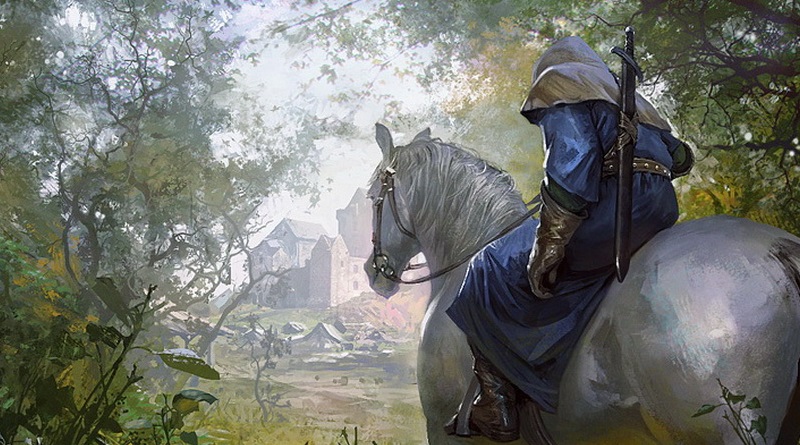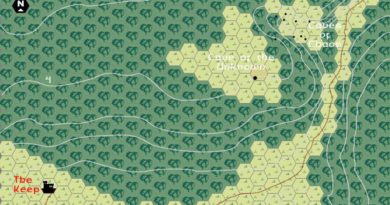Scout
A stealthy wilderness class
Scouts are humans who excel at speed and stealth in the wilderness, often employed to conduct recon missions, rescue or recovery operations, or act as point units for larger forces moving through hostile territory.
The prime requisite of a scout is Dexterity. A scout with a Dexterity score of 13 or greater will gain a bonus on earned experience points.
RESTRICTIONS: Scouts use six-sided dice (d6) to determine their hit points. They save and fight as thieves of equal level. To travel quickly and stealthily, they may wear only leather armour and may not use a shield. However, they may use any weapon.
SPECIAL ABILITIES: A scout’s training focuses on Wilderness Survival, which is a catch-all skill used for hunting and foraging (feeds 1 person per level per day), outdoor stealth (hiding and moving silently at 1/2 normal movement rate), tracking (detecting and following quarry), and finding/removing natural traps. Scouts can also climb natural surfaces (trees and rocky surfaces) and hear noise. Scouts are surprised only on a roll of 1 (d6) when fighting outdoors, and are also well-trained with missiles, gaining a +1 “to-hit” with bows, slings, and crossbows. Finally, scouts have the Fighter’s lance attack and set spear vs. charge abilities.
OPTIONAL: Each of the following options may be included if they suit the GM’s campaign and the player’s vision of the character; there is no impact to XP or advancement for including these:
- Any wilderness area where the scout spends a full experience level (i.e., where he earns and consecutively gains a level) may be designated as “familiar territory.” While in familiar territory, the scout gains a +1 to wilderness survival, climb, and hear noise rolls. The territory’s size is up to the GM, but usually has recognizable geographic boundaries (e.g., the Dark Forest, the Western Desert, the Lands from Here to the Sea, etc.).
- Scouts may wear chain mail armour, but suffer a -1 penalty to wilderness survival and climb rolls as a result.
- Scouts have a good sense of direction, and thus reduce the party’s chance of getting lost in the wilderness by 1 on a d6 (X56).
- Scouts can avoid unwanted attention in the wilderness, reducing the chance of a random encounter by 1 on a d6 (X57).
- When searching a wilderness hex for a specific person, place, or thing, the scout gains a +1 bonus on a d6 to find it.
Experience and Level Advancement
Experience Hit Wilderness Survival,
Level Title Points Dice Climb, Hear Noise†
----- ----- ----------- ---- ----------------
1 Lookout 0 1d6 1
2 Spotter 1,600 2d6 1
3 Rover 3,200 3d6 1-2
4 Explorer 6,400 4d6 1-2
5 Outrider 12,800 5d6 1-2
6 Pathfinder 26,400 6d6 1-3
7 Warden 52,800 7d6 1-3
8 Ranger 105,600 8d6 1-3
9 Scout 211,200 9d6 1-4
10 Master Scout 331,200 9d6+2* 1-4
11 Master Scout 451,200 9d6+4* 1-4
12 Master Scout 571,200 9d6+6* 1-5
13 Master Scout 691,200 9d6+8* 1-5
14 Master Scout 811,200** 9d6+10* 1-5
---------------
* Constitution adjustments no longer apply.
** 120,000 XP per level above 14th.
† Chance of success on d6; roll d8 in harsh weather or terrain.
Under the Hood
The scout class was built with the revised Excel tool from Building A More Perfect Class. For those checking the math, here’s how characteristics worked out:
HD: 6; Saving Throw: Thief; Attack: Cleric/Thief; Armour: Restricted; Weapons: Any; Spells: None; Special: x3 (lance attack, set spear vs. charge, special attack); Skills: x9 (awareness, hunting, hide, move silently, tracking, find/remove traps, climb, hear noise); WM: Non-fighter; Lvl Limit: Unlimited; Base XP: 1,600
Final Words
A few aspects that merit more playtesting and discussion:
- Does it make sense for the scout to be capable of stealth while wearing heavier armour at higher levels (e.g., shield at 4th-level, then chain at 9th)?
- Could the scout be classified as a sort of wilderness bounty hunter, and if so, do the class abilities change?
- Is the wilderness survival skill progression adequate?
So, all that said, let me know what you think. Is this a fun class to play? Does it work at higher levels? Am I better off with a burly thief, or a just a fighter?




I like it. I have a thought, you could also translate the Thieve’s ability to hide in shadows to a wilderness setting here as the Scout should be able to conceal him or herself from observation in natural terrain. Possibly the ability to construct a ghillie might improve this ability at higher levels. The skill would not be applicable in a city proper. Or a ghillie might be a new magic item. Certainly this class of character would be interested in invisible cloaks and slippers of silence and so on, if they even wear shoes. Use of armour might diminish the abilities of the character if noisy armour is worn. Mail would not be unheard of I would think for daily use.
I did consider just using the thief Hide in Shadows and Move Silently abilities as you describe (i.e., they only work outdoors), but skipped it because I don’t like how B/X presents thief abilities using percentages. That said, I updated Climb Walls above to a d6-based chance.
Love the idea of special gear for the scout. Like a ghillie suit that gives +1 to stealth rolls and an AC of 6 (equivalent to leather+shield), or climbing gear.
Thinking about high-level options (e.g., being stealthy in heavier armour), I’m wondering if a scout might operate at +1 in “home territory” after reaching 4th-level, let’s say. One of the challenges with the XP table above is that there’s not a lot of change from level-to-level, so some incentive to advance (besides more hit points) might be in order.
Big Thumbs Up!
UPDATE 8/14/15: Consolidated chance of success for Wilderness Survival, Climb, and Hear Noise skills; added “OPTIONAL” section which contains variants that the GM and player can incorporate without affecting XP requirements.
Your idea about the home territory is interesting. I’ll throw out a few more ideas for your consideration under Optional:
A scout might also possess mapping skills, or not need maps once having entered a hex, or observed an adjacent hex from a point of vantage. They would know the best route through it avoiding contact with encounters.
If an encounter is desired in a known map hex they might increase the chance of meeting the desired character or monster.
Guiding others unseen though a hex might also be one of a Scouts abilities, the number of characters escorted growing with each level.
Nice additions, Greg. I’ve massaged them a bit and added to the OPTIONAL section. Thanks for the ideas.
They look great, your rendering of what I was suggesting is spot on. I was fumbling for words and an approach but you hit the nail right on the head. By the way that article you did on Building the Perfect Class is great. I love the systematic approach which opens up so many routes for people to develop their own character classes.
Thanks, Greg. In the coincidence department, I just published an update to the class article: Building a more perfect class, which I’m hoping is easier to use and better balanced.
Pingback: The Desert of Mirages - Entrance to the Great Eastern Desert | Breeyark!